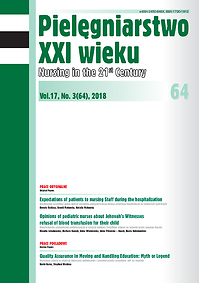Women’s postnatal care based on the Polish and international recommendations
DOI:
https://doi.org/10.2478/pielxxiw-2018-0020Keywords:
midwife, obstetric care, postpartum, midwiferyAbstract
WOMEN’S POSTNATAL CARE BASED ON THE POLISH AND INTERNATIONAL RECOMMENDATIONS
Introduction. The issue of high-risk pregnancy has been widely discussed in the recent years. As a result, many countries have introduced programs to improve perinatal care in order to meet the needs of pregnant women as well as those going into labour. Much less attention was dedicated to health and social circumstances of women in the postpartum period. The World Health Organisation developed a document (WHO Recommendations on Postnatal Care of the Mother and Newborn, 2013) in which it clearly defines recommendations formulated for the professionals who are care providers to the child and the mother after birth. The authors of the report indicate that the postnatal period is crucial for both the mothers and their children, and the lack of proper care given to them may lead to deterioration of their health and even death. According to the code of professional practice, the Polish midwife identifies and determines individuals’ requirements as well as health needs, recognizes nursing difficulties, and, effectively plans and oversees their care. The Polish guideline for the highest standard of medical care during pregnancy, the delivery, the postpartum period and the neonatal care is the Regulation of the Health Minister from 20th September 2012.
Aim. This paper collected current and adopted recommendations regarding postpartum care with an emphasis on the significant role of the midwife.
References
1. Kaźmierczak M, Gebuza G, Gierszewska M. Zaburzenia emocjonalne okresu poporodowego. Probl Pielęg. 2010; 18 (4): 503-511.
2. Mojs E, Czarnecka-Iwańczuk M, Głowacka M. Poziom lęku jako stanu i cechy oraz depresji we wczesnym połogu – doniesienia wstępne. Psychiatr Pol. 2013; tom XLVII (1): 31-40.
3. WHO recommendations on postnatal care of the mother and newborn. World Health Organization. 2013. dostęp : http://www.who.int/maternal_child_adolescent/documents/postnatal-care-recommendations/en/ [dostęp z dnia 04.07.2018 r.].
4. Każmierczak M, Gebuza G, Gierszewska M, Michalska E. Problemy kobiet w połogu i ich przyczyny. Perinatol Neonatol Ginekol. 2010; 3 (4): 290-295.
5. Krzyżanowska-Zbucka J. Problemy emocjonalne kobiet w okresie okołoporodowym. Warszawa: Fundacja Rodzić po Ludzku. 2008; 21-37.
6. Postpartum Care of the Mother and Newborn: a practical guide. WHO/RHT/MSM/98.3.WHO; 1998.
7. Landau R, Kraft JC, Flint LY, et al. An Experimental Paradigm for the Prediction of Post-Operative Pain (PPOP). J. Vis. Exp. 2010; 35, doi:10.3791/1671.
8. Thompson JF, Roberts CL, Currie M, Ellwood DA. Prevalence and persistence of health problems after childbirth: associations with parity and method of birth. Birth. 2002; 29: 83-94.
9. Rozporządzenie Ministra Zdrowia z dnia 20 września 2012r. w sprawie standardów postępowania oraz procedur medycznych przy udzielaniu świadczeń zdrowotnych z zakresu opieki okołoporodowej sprawowanej nad kobietą w okresie fizjologicznej ciąży, fizjologicznego porodu, połogu oraz opieki nad noworodkiem. Dz.U. 2012 nr 0 poz. 1100.
10. Bączek G, Golubińska H, Dmoch-Gajzlerska E. Wybrane problemy okresu połogowego – rola położnej środowiskowo-rodzinnej. Prz Med Uniw Rzesz Inst Leków. 2012; 2: 200-212.
11. Rozporządzenie Ministra Zdrowia z dnia 24 września 2013 roku w sprawie świadczeń gwarantowanych z zakresu podstawowej opieki zdrowotnej – Załącznik nr 3. Dz. U. 2015 r. poz. 581, z późn. zm.
12. Iwanowicz-Palus G, Krysa J, Bień A. Rola położnej rodzinnej w Polsce. Med. Og Nauk Zdr. 2013; 19 (3): 272-278.
Published
Issue
Section
License
Copyright (c) 2018 Authors

This work is licensed under a Creative Commons Attribution-NonCommercial-NoDerivatives 3.0 Unported License.




